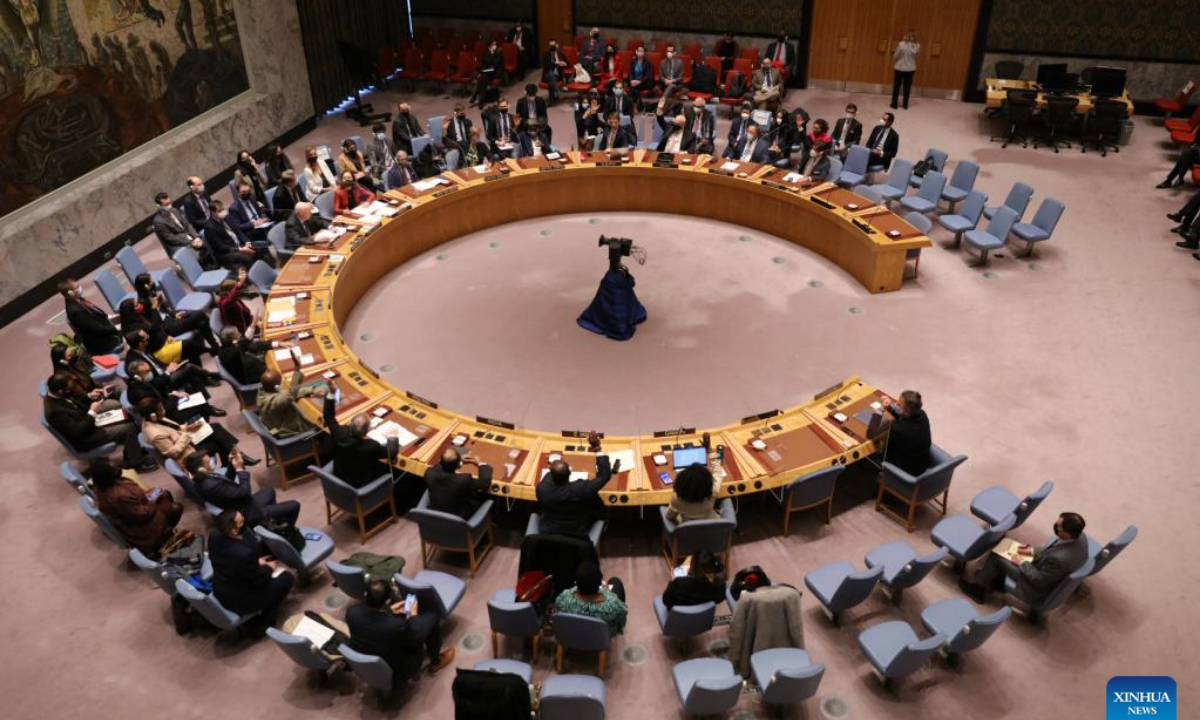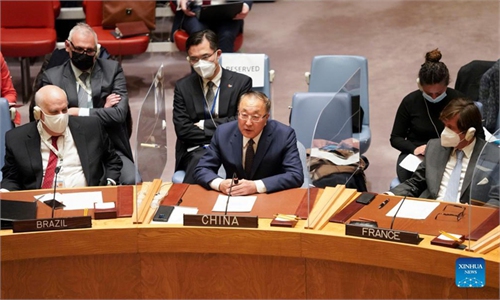China agrees with subjecting UNSC veto to debate, but also raises concerns over its potential procedural confusion

The United Nations Security Council votes on a draft resolution requesting a UN General Assembly emergency session on Ukraine at the UN headquarters in New York, on Feb. 27, 2022. The UN Security Council (UNSC) on Sunday adopted Resolution 2623 that calls for an "emergency special session" of the UN General Assembly to consider and recommend collective action on the Ukraine crisis. Photo: Xinhua
The UN General Assembly passed a resolution that allows it to convene automatically when a veto is cast. China's UN representative said that China understands the original intention of the move, but is also concerned over the procedural confusion and inconsistency in practice it may cause, and whether it can achieve its intended purpose.
A General Assembly meeting will automatically be triggered within 10 days after a veto is cast by one of the five permanent members of the UN Security Council - China, Russia, the US, the UK and France.
China supports the UN General Assembly in fulfilling its responsibilities and playing an active and important role as mandated by the UN Charter. Thus, we can understand and agree with the original intention of this resolution, Jiang Hua, Chinese counselor of the Permanent Representative of China to the UN, said in his explanatory statement.
"We are in favor of member states discussing on the platform of the UN General Assembly regarding disagreements among the permanent members, which prevent the UNSC from taking action on major issues related to peace and security,' Jiang said.
The resolution gave the UN General Assembly a new mandate - establishing a mechanism to automatically trigger the UN General Assembly to hold a meeting - which "in practice is likely to cause procedural confusion and inconsistency," Jiang noted.
The Chinese counselor said that it is difficult to determine whether such an arrangement will achieve the intended purpose of the resolution.
Adoption of the resolution, which does not eliminate the veto power of five permanent members of the UNSC but requires a debate on that proposal, came after Russia cast a veto on its special military operations in Ukraine.
The purpose of the resolution is to uphold genuine multilateralism, maintain common security and seek common development, but such an arrangement may weaken the role of the veto in balancing direct confrontations of major powers established since World War II, Lü Xiang, a research fellow at the Chinese Academy of Social Sciences, told the Global Times.
Though debate may result in the voices of more countries being heard, it at the same time generates more unnecessary noise, which cannot effectively affect any decision of the UNSC, but would only interrupt the decision-making process, he said.
From this sense, UN reform should focus more on improving the efficiency of decision-making and execution, rather than targeting the veto power of permanent members, Lü said.
Placing permanent members under the microscope of global scrutiny and opinion when they make use of the veto power on a proposal brings certain self-restrictions to permanent members, and it may also expand confrontations among blocs as the proposal is discussed in procedure, analysts said.
A Beijing-based professor who specializes in international relations, speaking on condition of anonymity, told the Global Times that the truth of the resolution is sort of in favor of the US' strategy of great power competition, and this will expand competition between great powers in the UN.
The US demonstrated its confidence in promoting this resolution to be passed driven by the Russia-Ukraine crisis, but if one day in the future the majority of the international community has an entirely different view from the US on some issues, it's hard to tell whether the US can gain wide support or withstand doubts from UN member states, Lü said.
The US also used its veto power a lot of times in history, and sometime it even bypassed the UN to launch wars against other sovereign countries without the authorization of the UNSC. So, would the US sincerely respect such a change when one day, it finds its veto generates great opposition? Lü questioned.
"I doubt that the US would give up and obey the UN decision," Lü noted.
"A coin has two sides. We will see where such a UN resolution will lead, how it will impact the interests and sovereignty of nations, how it will prevent the UN from being hijacked by some major powers," the Beijing-based expert said.
Among the five permanent members,Russia and the former Soviet Union made use of their veto power 120 times, followed by 82 for the US, 27 for Britain, 17 for China and 16 for France.
He Zhipeng, a professor of international law at School of Law, Jilin University, told the Global Times that the resolution "brings both opportunities and challenges to China."
Such a debate in the General Assembly allows developing countries like China to clarify their in-depth views on regional or global affairs and helps other countries see more truth in a rational, forceful and effective manner, He said.
But it also puts forward higher requirements for diplomats, that they must have a better grasp of their country's position on security and development initiatives in the international organization, He said.


